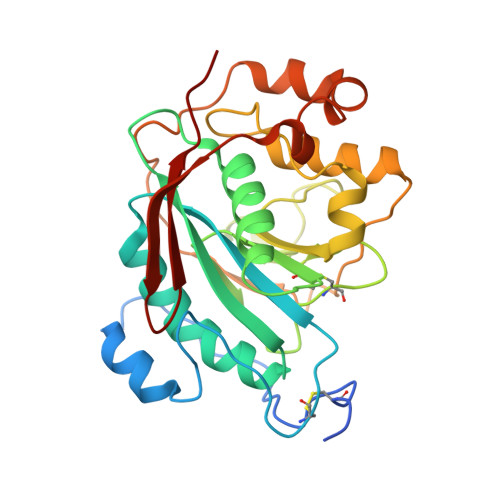Investigations on beta 1,4-galactosyltransferase I using 6-sulfo-GlcNAc as an acceptor sugar substrate.
Ramakrishnan, B., Moncrief, A.J., Davis, T.A., Holland, L.A., Qasba, P.K.(2013) Glycoconj J 30: 835-842
- PubMed: 23942731
- DOI: https://doi.org/10.1007/s10719-013-9488-4
- Primary Citation of Related Structures:
4KRV - PubMed Abstract:
6-sulfate modified N-acetylglucosamine (6-sulfo-GlcNAc) is often found as part of many biologically important carbohydrate epitopes such as 6-sulfo-Le(X). In these epitopes, the 6-sulfo-GlcNAc moiety is extended by a galactose sugar in a ¶¬1-4 linkage. The ¶¬4GalT1 enzyme transfers galactose (Gal) from UDP-Gal to N-acetylglucosamine (GlcNAc) in the presence of manganese. Here we report that the ¶¬4GalT1 enzyme transfers Gal to the 6-sulfo-GlcNAc and 4-methylumbelliferyl-6-sulfo-N-acetyl-¶¬-D-glucosaminide (6-sulfo-¶¬GlcNAc-MU) acceptor substrates, although with very low efficiency. To understand the effect that the 6-sulfate group on the GlcNAc acceptor has on the catalytic activity of the ¶¬4GalT1 molecule, we have determined the crystal structure of the catalytic domain of bovine ¶¬4GalT1 mutant enzyme M344H-¶¬4GalT1 complex with the 6-sulfo-GlcNAc molecule. In the crystal structure, the 6-sulfo-GlcNAc is bound to the protein in a way that is similar to the GlcNAc molecule. However, the 6-sulfate group engages in additional interactions with the hydrophobic region, residues 276-285, of the protein molecule, and this group is found wedged between the aromatic side chains of Phe-280 and Trp314 residues. Since the side chain of the Trp314 residue undergoes conformational changes during the catalytic cycle of the enzyme, molecular interaction between Trp314 and the 6-sulfate group might hinder this conformational change. Therefore, the lack of a favorable binding environment, together with hindrance to the conformational changes, might be responsible for the poor catalytic activity.
Organizational Affiliation:
Structural Glycobiology Section, Basic Science Laboratory, National Cancer Institute at Frederick, P.O. Box B, Frederick, MD, 21702, USA.




















